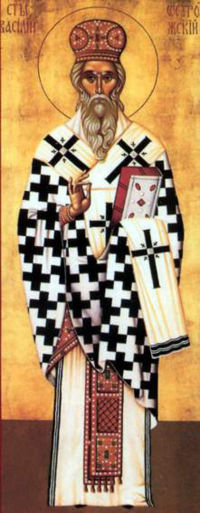Basil of Ostrog
Our father among the saints Basil of Ostrog and Tvrdoš the Miracle-worker (Serbian: Свети Василије острошки и и тврдошки чудотворац) was the Serbian Orthodox Metropolitan of Zahum and Herzegovina from 1639 to 1671. His feast day is April 29.
Early life
St. Basil was born in Mrkonjić, a village in Herzegovina, of simple and God-fearing parents named Petar and Ana Jovanović (Петар и Ана Јовановић). His baptismal name was Stojan (Стојан). From his youth, he was filled with love for the Church of God. He was taught the Holy Scriptures in the Zavala Monastery. His teacher was Serafim, the monastery's igumen. When Stojan reached maturity, Fr. Serafim sent him to the Monastery of the Dormition (Assumption) of the Theotokos (Tvrdoš), near Trebinje. Stojan was tonsured a monk with the name Basil and was then ordained deacon and presbyter. As a monk, he quickly became renowned because of his genuine and rare ascetical life. Soon he was raised to archimandrite. Saint Basil took upon himself mortification upon mortification, each one heavier and more difficult than the last. He spent one year on Mount Athos.
Metropolitan
When Basil returned in 1638, he was elected and consecrated Metropolitan of Western Herzegovina, against his will. As a hierarch, he first lived in the Tvrdoš Monastery, from which he, as a good shepherd, strengthened his flock in the Orthodox Faith, protecting them from the cruelty of the Turks and the cunning ways of the Latins. When Basil was exceedingly pressed by his enemies and when Tvrdoš was destroyed by the Turks, he moved to Ostrog, accompanied by thirty monks, where he continued to live an austere ascetical life, protecting his flock by his ceaseless and fervent prayer. Patriarch Gavrilo I appointed Basil Metropolitan of Eastern Herzegovina on November 27, 1651. He died peacefully in the Lord on April 29, 1671, leaving behind his incorruptible relics, which are still uncorrupted and miracle-working to the present day. The miracles at the grave of St. Basil are without number. Christians and Muslims alike come before his relics and find healing of their most grave illnesses and afflictions. A great people's assembly (pilgrimage) occurs there annually on the Feast of Pentecost.
| Basil of Ostrog | ||
|---|---|---|
| Preceded by: ? |
Metropolitan of Western Herzegovina and Zahum 1639-1651 |
Succeeded by: ? |
| Preceded by: ? |
Metropolitan of Eastern Herzegovina and Polimlje 1651-1671 |
Succeeded by: ? |
Sources
Categories > Church History
Categories > Church History
Categories > Church History
Categories > Liturgics > Feasts
Categories > Liturgics > Feasts
Categories > Liturgics > Feasts
Categories > People > Clergy > Bishops
Categories > People > Clergy > Bishops > Bishops by century > 17th-century bishops
Categories > People > Saints
Categories > People > Saints > Saints by century > 17th-century saints
Categories > People > Saints > Serbian Saints
